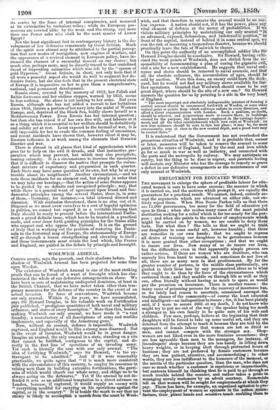WOOLWICH ARSENAL.
CONING events, says the proverb, cast their shadows before. The shadow of Woolwich Arsenal has been projected for some time upon Weedon.
The existence of Woolwich Arsenal is one of the most striking proofs that can be found of a want of foresight which has cha- racterized the whole of our defensive arrangements on shore. We have been so sure of maintaining undisputed dominion, at least in the British Channel, that we have never taken other than tem- porary measures for the defence of the country in the event of an actual invasion. By force of convenience, Woolwich became our only arsenal. Within it, for years, we have accumulated, says Sir Howard Douglas, in his valuable work on Fortification just published, " prodigious quantities of both naval and military ordnance, and stores of every description." More than this, besides making Woolwich our only arsenal, we have made it "a vast foundry, a manufactory of all descriptions of arms and warlike implements, and especially of the Armstrong guns."
. Now, without an arsenal, defence is impossible. Woolwich captured, and England would be like a strong man disarmed. But in the event of invasion, Woolwich would be in great danger. Imagine an arsenal, the only arsenal in a state, standing on a site that cannot be fortified, contiguous to the capital, and di- rectly in the first line 'of operations of an invading army. Yet such is literally the case with our only arsenal. " The idea of fortifying Woolwich," says Sir Howard, " is too ex- frava Dant to be admitted." And if it were reasonably practicable, we quite agree that " it is tench more consistent with the circumstances of this country., to employ its resources in raising men than in building extensive fortifications, the garri- sons of which would absorb our whole army, and oblige as to be always acting on the defensive." Yet if the arsenal be not de- fended it acts as an additional temptation to a direct advance on London, because; 'if 'captured, it would supply an enemy with " everything needful- for' carrying on his operations against the capital, or in the coaxal." It is beside the mark to say that no enemy 'is-likely to accomplish a march from the coast to Wool- wich, and that therefore to remove the arsenal would-be an use-r less expense. A nation should not, if it has the power, place any' vital element of defence at the mercy of probabilities. If We violate military principles by maintaining our only arsenal "is an advanced, exposed, defenceless, and indefensitle position," in front of the capital, instead of behind it in some central spot, we run the risk of incurring a tremendous disaster, because we should practically leave the fate of Woolwich to chance. On this point the authority of an accomplished soldier like Sir Howard Douglas should be conclusive. Sir Howard, having criti-. cized the weak points of Woolwich, does not shrink from the re-, sponsibility of recommending a plan of curing the gigantic evil, and a site for a new establishment. He suggests that naval ord- nance and stores should be removed to naval arsenals, and that all the obsolete ordnance, the accumulation of ages, should be sold by auction. Were this done, an enemy could burn the dock- yard, but he would not find any military stores available for fur- ther operations. Granted that Woolwich should cease to be our great depot, where should be the site of a new one ? Sir Howard answers the question for us by pointing to a site in the very heart of England. " The most important and absolutely indispensable measure of forming a central arsenal should be commenced forthwith at Weedon, or some other central point or points from which railways radiate in every direction, and- afford a direct communication with London. Such a position, no doubt, should be selected, and pTeparations made to receive there, in buildings erected for the purpose, Che machinery employed in the carriage depart- ment., and all the other establishments which now exist at Woolwich : no new iron ordnance should be sent to this last place; it may be, far more conveniently, sent at Oiee to the new central depbt, and a proof-butt may be erected there."
It is understood that the Government has not overlooked the precarious situation of Woolwich, and it is probable that, sooner or later, measures will be taken to remove the arsenal to some point in the centre of England, hard by the coal and iron which go for so much in war as well as industry, and connected with the ports and the metropolis by railway. 'We may anticipate an outcry, but the thing. to be done is urgent, and patriotic feeling will sustain any Minister who has the courage to remedy so grave a defect in our defensive arrangements as the maintenance of our only arsenal at Woolwich.


























 Previous page
Previous page